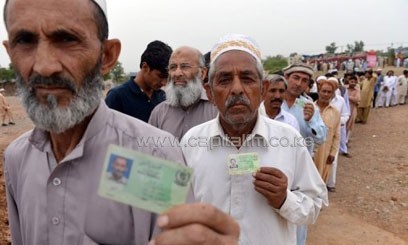
Voters display their national identity cards as they queue up to cast their vote in Islamabad. Photo/ AFP
ISLAMABAD, May 11 – Pakistanis queued up to vote in landmark elections across the country on Saturday, defying deadly Taliban attacks to take part in an historic democratic transition for the nuclear-armed state.
A bomb attack claimed by the Taliban killed 11 people and wounded around 40 others in Karachi, but it appeared to have little effect on enthusiastic turnout in other parts of the city, as well as Islamabad, Lahore and Peshawar.
More than 86 million people are eligible to vote at 70,000 polling stations for the 342-member national assembly and four provincial assemblies in Khyber Pakhtunkhwa, Punjab, Sindh and Baluchistan. Polls close at 5:00 pm.
The vote marks the first time that an elected civilian administration has completed a full term and handed power to another through the ballot box in a country where there have been three military coups and four military rulers.
The front-runner is ex-prime minister Nawaz Sharif, head of the centre-right Pakistan Muslim League-N (PML-N), but much of the campaign has been electrified by cricket star Imran Khan with promises of reform and an end to corruption.
Queues gathered outside polling stations in Pakistan’s main cities where some people said they were nervous about security, but others spoke enthusiastically about exercising their democratic right and voting for change.
“People have been up all night, actually I haven’t slept, a lot of my friends haven’t slept. People just wanted to come out and do this, because we never had this chance,” said Natasha Ejaz, a singer, in Islamabad.
In Pakistan’s financial hub Karachi, the Taliban targeted a provincial assembly candidate for the Awami National Party (ANP), one of the secular parties in the outgoing government.
An AFP photographer said a child aged three or four was among 11 dead laid out in the morgue. Police said one of the candidate’s guards was also killed.
The target, Amanullah Mehsud, escaped unhurt, senior police official Mazhar Nawaz said. The Taliban, who consider democracy un-Islamic and have vowed to disrupt the vote with suicide attacks, quickly claimed responsibility.
In Karachi, there were long queues in some areas, but voting was more sluggish in other neighbourhoods where people spoke of security fears.
An AFP reporter said voting was delayed at 12 polling stations he visited, as officials awaited the delivery of ballot boxes and papers.
Election commission official Najeeb Ahmed said that any delays at polling booths would be compensated by extending voting hours.
Commentators are divided on whether a wealth of enthusiastic first-time voters and Taliban threats will make turnout higher or lower than the 44 percent at the last elections in 2008.
The main issues are the tanking economy, an appalling energy crisis that causes power cuts of up to 20 hours a day, the alliance in the US-led war on Islamist militants, chronic corruption and the dire need for development.
More than 600,000 security personnel have deployed to protect the vote and around half of all polling stations have been declared at risk of attack, many of them in insurgency-torn parts of Baluchistan and the northwest.
Pakistan also sealed its border with Afghanistan and Iran to boost security.
Pre-election violence killed at least 127 people, according to an AFP tally, and the campaign has been called the bloodiest in the country’s history.
In the northwest, the part of the country most troubled by an almost seven-year Taliban insurgency, bombs wounded 12 people — eight near a women’s polling station in Peshawar and four others near a polling station in Mardan district.
“We have already spent a lot of time being scared of terror threats. Today, we have to take a decision and bury this state of fear once and for all,” said Suhail Ahmad, a shopkeeper in Peshawar.
In North Waziristan, a notorious Taliban stronghold, mosque loudspeakers announced that no woman would be allowed to leave their home to vote, according to local residents. Women’s turnout is traditionally low in conservative areas.
The PML-N and PPP have dominated politics for decades, led by two of the richest families in the country, the Sharifs and the Bhuttos.
The outgoing centre-left Pakistan People’s Party (PPP) has run a lacklustre and rudderless campaign, with its chairman Bilawal Bhutto Zardari too young to run and largely hidden from public view due to Taliban threats.
But Khan has sought to galvanise a young, urban middle class with promises of sweeping change.
With no reliable polling data, Sharif has been earmarked the most probable winner but if PTI do well enough to become a formidable opposition, there are concerns that the emergent coalition will be weak and possibly short-lived.
Sharif served as prime minister from 1990-93, when he was sacked for corruption, and from 1997-99, when he was deposed by the military, although his family say he is a changed man who will this time govern more successfully.









































